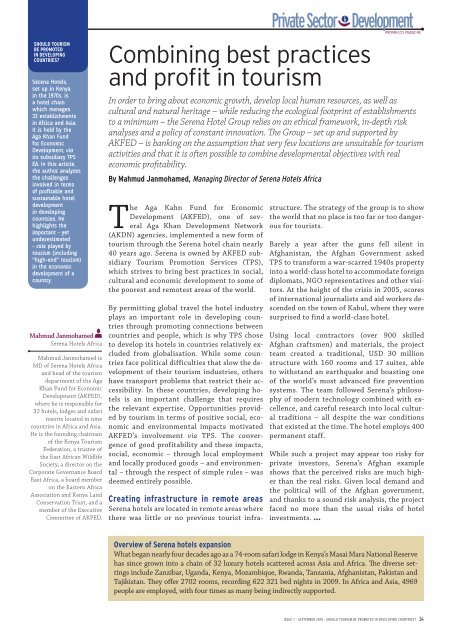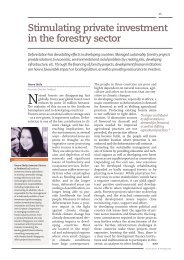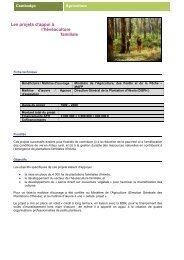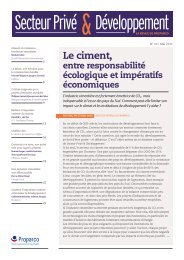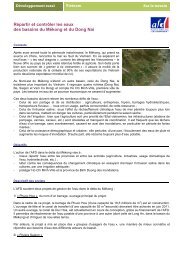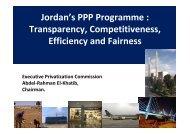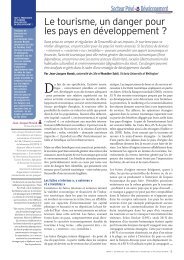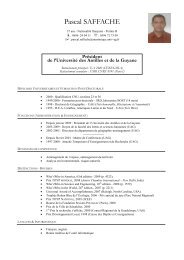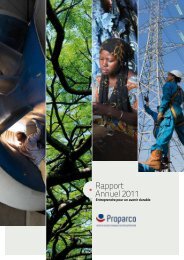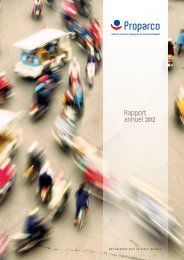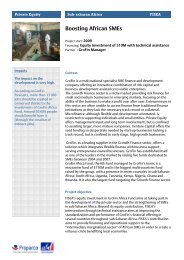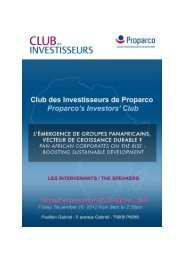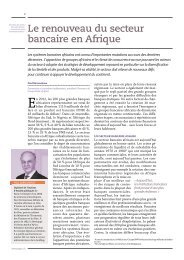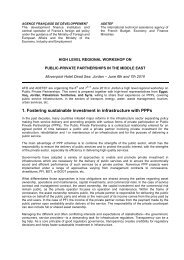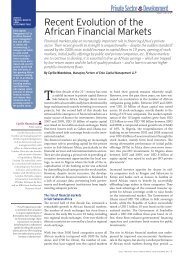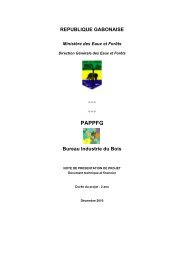Download Mahmud Janmohamed - Proparco
Download Mahmud Janmohamed - Proparco
Download Mahmud Janmohamed - Proparco
Create successful ePaper yourself
Turn your PDF publications into a flip-book with our unique Google optimized e-Paper software.
SHOULD TOURISM<br />
BE PROMOTED<br />
IN DEVELOPING<br />
COUNTRIES?<br />
Serena Hotels,<br />
set up in Kenya<br />
in the 1970s, is<br />
a hotel chain<br />
which manages<br />
32 establishments<br />
in Africa and Asia.<br />
It is held by the<br />
Aga Khan Fund<br />
for Economic<br />
Development, via<br />
its subsidiary TPS<br />
EA. In this article,<br />
the author analyzes<br />
the challenges<br />
involved in terms<br />
of profitable and<br />
sustainable hotel<br />
development<br />
in developing<br />
countries. He<br />
highlights the<br />
important – yet<br />
underestimated<br />
– role played by<br />
tourism (including<br />
“high-end” tourism)<br />
in the economic<br />
development of a<br />
country.<br />
<strong>Mahmud</strong> <strong>Janmohamed</strong><br />
Serena Hotels Africa<br />
<strong>Mahmud</strong> <strong>Janmohamed</strong> is<br />
MD of Serena Hotels Africa<br />
and head of the tourism<br />
department of the Aga<br />
Khan Fund for Economic<br />
Development (AKFED),<br />
where he is responsible for<br />
32 hotels, lodges and safari<br />
resorts located in nine<br />
countries in Africa and Asia.<br />
He is the founding chairman<br />
of the Kenya Tourism<br />
Federation, a trustee of<br />
the East African Wildlife<br />
Society, a director on the<br />
Corporate Governance Board<br />
East Africa, a board member<br />
on the Eastern Africa<br />
Association and Kenya Land<br />
Conservation Trust, and a<br />
member of the Executive<br />
Committee of AKFED.<br />
Combining best practices<br />
and profit in tourism<br />
In order to bring about economic growth, develop local human resources, as well as<br />
cultural and natural heritage – while reducing the ecological footprint of establishments<br />
to a minimum – the Serena Hotel Group relies on an ethical framework, in-depth risk<br />
analyses and a policy of constant innovation. The Group – set up and supported by<br />
AKFED – is banking on the assumption that very few locations are unsuitable for tourism<br />
activities and that it is often possible to combine developmental objectives with real<br />
economic profitability.<br />
By <strong>Mahmud</strong> <strong>Janmohamed</strong>, Managing Director of Serena Hotels Africa<br />
The Aga Kahn Fund for Economic<br />
Development (AKFED), one of several<br />
Aga Khan Development Network<br />
(AKDN) agencies, implemented a new form of<br />
tourism through the Serena hotel chain nearly<br />
40 years ago. Serena is owned by AKFED subsidiary<br />
Tourism Promotion Services (TPS),<br />
which strives to bring best practices in social,<br />
cultural and economic development to some of<br />
the poorest and remotest areas of the world.<br />
By permitting global travel the hotel industry<br />
plays an important role in developing countries<br />
through promoting connections between<br />
countries and people, which is why TPS chose<br />
to develop its hotels in countries relatively excluded<br />
from globalisation. While some countries<br />
face political difficulties that slow the development<br />
of their tourism industries, others<br />
have transport problems that restrict their accessibility.<br />
In these countries, developing hotels<br />
is an important challenge that requires<br />
the relevant expertise. Opportunities provided<br />
by tourism in terms of positive social, economic<br />
and environmental impacts motivated<br />
AKFED’s involvement via TPS. The convergence<br />
of good profitability and these impacts,<br />
social, economic – through local employment<br />
and locally produced goods – and environmental<br />
– through the respect of simple rules – was<br />
deemed entirely possible.<br />
Creating infrastructure in remote areas<br />
Serena hotels are located in remote areas where<br />
there was little or no previous tourist infra-<br />
structure. The strategy of the group is to show<br />
the world that no place is too far or too dangerous<br />
for tourists.<br />
Barely a year after the guns fell silent in<br />
Afghanistan, the Afghan Government asked<br />
TPS to transform a war-scarred 1940s property<br />
into a world-class hotel to accommodate foreign<br />
diplomats, NGO representatives and other visitors.<br />
At the height of the crisis in 2005, scores<br />
of international journalists and aid workers descended<br />
on the town of Kabul, where they were<br />
surprised to find a world-class hotel.<br />
Using local contractors (over 900 skilled<br />
Afghan craftsmen) and materials, the project<br />
team created a traditional, USD 30 million<br />
structure with 160 rooms and 17 suites, able<br />
to withstand an earthquake and boasting one<br />
of the world’s most advanced fire prevention<br />
systems. The team followed Serena’s philosophy<br />
of modern technology combined with excellence,<br />
and careful research into local cultural<br />
traditions – all despite the war conditions<br />
that existed at the time. The hotel employs 400<br />
permanent staff.<br />
While such a project may appear too risky for<br />
private investors, Serena’s Afghan example<br />
shows that the perceived risks are much higher<br />
than the real risks. Given local demand and<br />
the political will of the Afghan government,<br />
and thanks to a sound risk analysis, the project<br />
faced no more than the usual risks of hotel<br />
investments. ...<br />
Overview of Serena hotels expansion<br />
What began nearly four decades ago as a 74-room safari lodge in Kenya’s Masai Mara National Reserve<br />
has since grown into a chain of 32 luxury hotels scattered across Asia and Africa. The diverse settings<br />
include Zanzibar, Uganda, Kenya, Mozambique, Rwanda, Tanzania, Afghanistan, Pakistan and<br />
Tajikistan. They offer 2702 rooms, recording 622 321 bed nights in 2009. In Africa and Asia, 4969<br />
people are employed, with four times as many being indirectly supported.<br />
ISSUE 7 - SEPTEMBER 2010 - SHOULD TOURISM BE PROMOTED IN DEVELOPING COUNTRIES? 14
Combining best practices and profit in tourism<br />
By <strong>Mahmud</strong> <strong>Janmohamed</strong>, Managing Director of Serena Hotels Africa<br />
... Limiting social and environmental<br />
impacts in undeveloped regions<br />
The strategy of AKFED is to implement highquality<br />
hotels in remote regions and to make<br />
them accessible worldwide, while highlighting<br />
the social and cultural environment, and giving<br />
priority to local employment often through<br />
training members of local communities. This<br />
philosophy is built on the understanding that<br />
while mass travel has made even the remotest<br />
corners of the world accessible to tourists,<br />
growing numbers of visitors places a huge<br />
burden on local environments. The presence<br />
of these hotels in remote areas requires the<br />
implementation of specific programs to treat<br />
waste and water and to mitigate the effect<br />
their massive use of electricity could have on<br />
the surrounding population’s access to power.<br />
To mitigate these effects, decisions to construct<br />
new hotels are never taken hastily. They<br />
follow a meticulous assessment of a project’s<br />
environmental impact, measuring the benefits of<br />
development, such as job creation, the economic<br />
stimulus of construction and sourcing, and the<br />
outreach into health and education, against the<br />
hotel’s ecological ‘footprint’. These assessments<br />
are conducted by external experts. While TPS has<br />
never renounced a project following the results<br />
of an assessment, all actions recommended<br />
are followed through. An example is the use of<br />
the water source at NgoroNgoro Serena Lodge<br />
(Tanzania), which would have negatively impacted<br />
water availability for the Masai population.<br />
Serena consequently invested in a five kilometre<br />
pipeline at considerable cost to draw water from<br />
an alternative source. Also, at Amboseli Serena<br />
Lodge (Kenya), the experts recommended a<br />
wetland system for effluent disposal, and this<br />
was incorporated into the project.<br />
This environmentally friendly approach has<br />
earned Serena numerous awards, including<br />
the Skål International Ecotourism Award and<br />
East Africa’s Most Respected Company Award. 1<br />
Serena Hotels won the 2008 Skål International<br />
Ecotourism Award in the Global Corporate<br />
Establishments category, which includes contributions<br />
made towards conservation of the<br />
environment and cultural heritage, community<br />
involvement and benefits, educational features,<br />
and innovation. In addition, all Serena<br />
properties are recognised by global environmental<br />
bodies sponsored by the Travel and<br />
Tourism Council. Kenya’s Amboseli Serena<br />
Lodge has won several awards from organisations<br />
that foster eco-tourism and responsible<br />
tourism, for reforestation efforts in the<br />
Amboseli National park. 2<br />
Likewise, culture is an essential part of the<br />
ethos. Rather than presenting a homogenous<br />
experience typified by standard rooms and materials,<br />
each hotel sources materials locally and<br />
undertakes careful research to ensure that the<br />
design reflects local traditions. Similarly, developing<br />
local skills is encouraged through frequent<br />
training programmes, and employing<br />
expatriate staff is minimised. Priority is placed<br />
on hiring and training locals for employment<br />
at all levels of the organisation, including senior<br />
management, with local people currently<br />
making up 97% of the staff.<br />
Development within an ethical framework<br />
The Serena group makes strategic investments –<br />
not only in terms of financial returns but also in<br />
terms of impact on the economic development of<br />
countries – which many private investors might<br />
be reluctant to make given the risks perceived.<br />
Such investments, however, promise to produce<br />
a significant multiplier effect as their impact<br />
ripples through local communities.<br />
While directly respecting social and environmental<br />
considerations during operations, the<br />
hotels can also have an indirect social and cultural<br />
impact. AKFED does seek to generate profits<br />
but also acts as an economic development<br />
agency, as profits are reinvested in further economic<br />
development projects or are used to subsidise<br />
social initiatives. Consequently, companies<br />
such as Alltex and Frigoken in Kenya, for<br />
instance, in which AKFED has invested, have<br />
contributed to improving welfare with services<br />
such as on-site child care – for example, at<br />
the Alltex garment manufacturing plant – and<br />
healthcare. The social programmes of AKFED<br />
not only include health, sanitation, education<br />
and training, they also support employment<br />
and promote women. Rural areas are not excluded,<br />
as social services to farmers are provided,<br />
including basic education, healthcare and<br />
programmes for clean drinking water. ...<br />
1<br />
Skål International, the largest<br />
organisation of travel and<br />
tourism professionals in the<br />
world, initiated the Ecotourism<br />
awards programme in 2002 to<br />
encourage conservation and<br />
promote sustainable practices<br />
in tourism.<br />
2<br />
In Amboseli, Kenya, AKFED<br />
led a reforestation campaign<br />
that has planted more than<br />
200 000 trees. The campaign<br />
was awarded a Green Globe<br />
commendation and an<br />
Environmental Award by the<br />
American Society of Travel<br />
Agents.<br />
ISSUE 7 - SEPTEMBER 2010 - SHOULD TOURISM BE PROMOTED IN DEVELOPING COUNTRIES? 15
Combining best practices and profit in tourism<br />
By <strong>Mahmud</strong> <strong>Janmohamed</strong>, Managing Director of Serena Hotels Africa<br />
... This ethical framework extends to respect for<br />
the ecology and culture of the regions in which<br />
the hotels are built. Often working closely with<br />
the Aga Khan Trust for Culture (AKTC), which<br />
is involved in a series of restoration projects<br />
in Asia and Africa, the Aga Khan Foundation,<br />
which is active in the health and education sectors,<br />
and the Aga Khan Agency for Microfinance,<br />
the hotels have proven to be economic engines<br />
within an integrated development strategy.<br />
In Pakistan, for example, the Serena hotel in<br />
Quetta operates in a 17 th century fort and palace<br />
restored by AKTC. It sources most of its<br />
furniture and furnishings locally, encouraging<br />
the development of local skills, while minimising<br />
the use of expatriate staff. In the same area,<br />
other AKDN agencies provide microfinance,<br />
offer skills training, construct sanitation and<br />
potable water systems, and show farmers how<br />
to boost crop yields.<br />
In Zanzibar, Serena converted an underused<br />
19 th century telecoms building and the adjacent<br />
18 th century structures into a standard-setting<br />
hotel at the edge of the world heritage site Stone<br />
Town. AKTC, meanwhile, has restored 11 landmark<br />
buildings and rehabilitated the central<br />
public space Forodhani Park. The foundation<br />
has worked with the government to improve<br />
health care and early childhood education.<br />
Kabul Serena hotel, in Afghanistan, is involved<br />
in cultural restoration, health care,<br />
rural development, education, microfinance<br />
and mobile telecommunications. Companies<br />
such as Roshan, 3 Afghanistan’s telecommunications<br />
company, have helped develop Kabul<br />
University through donating a video conference<br />
facility and satellite network access to enable<br />
distance learning for academic staff.<br />
This integrated, ethical approach to development<br />
makes Serena different from traditional<br />
profit-oriented commercial ventures in the<br />
tourism sector. Profits are often reinvested in<br />
other projects or special programs in order to<br />
stimulate economic activities and improve social<br />
and environmental standards. Serena hotels<br />
are designed to cause what the Aga Khan<br />
calls ‘a ripple effect’, one that galvanises the<br />
local economy and brings excellence and best<br />
practices to some of the poorest corners of the<br />
world. About one-third of purchases come from<br />
local communities surrounding the Serena<br />
units, boosting local economic activity.<br />
During economic downturns or volatile periods,<br />
Serena’s policy is to retain staff, with layoffs<br />
regarded as a last option. Even though<br />
profit maximisation is not the principal aim,<br />
TPS Eastern Africa (TPSEA) 4 generated a double-digit<br />
profit margin in 2009 (Table 1). The<br />
Global Credit Rating Co 5 (GCR) gave TPS EA<br />
an excellent rating and economic performance<br />
review, noting its resilience in the face<br />
of political volatility in Kenya. According to<br />
GCR, the company has consistently generated<br />
strong double-digit profit margins, notwithstanding<br />
the post-electoral crisis in Kenya and<br />
the global economic crisis that effected profitability<br />
in 2008. The strong recovery of the<br />
Kenyan tourism industry in 2009 was favourably<br />
viewed, with the resumption of historical<br />
trends anticipated. This was supported by the<br />
favourable turnaround in profitability for the<br />
months ending September 2009.<br />
AKFED shows that profitability and development<br />
are two notions that can serve each other.<br />
However, to work, this compatibility must be<br />
based on a strong risk analysis. Calculated risk is<br />
an inevitable underlying element of the AKFED<br />
philosophy, since its motivation is to invest in<br />
poor and frequently unstable areas that present<br />
higher risks than elsewhere. •<br />
Table 1: Main financial ratios of TPS EA in 2009<br />
Sales<br />
(USD million)<br />
EBITDA<br />
EBIT margin<br />
52.3 21% 15.8% 4.9<br />
Source: Author<br />
3<br />
AKFED is the majority<br />
shareholder of Roshan. For<br />
further information, see<br />
issue 4 of Private Sector and<br />
Development.<br />
4<br />
In 2006, TPS has been<br />
restructured under the name<br />
TPS EA and listed on the<br />
Nairobi Stock Exchange as<br />
a public company with TPS<br />
(Kenya), TPS (Tanzania) and<br />
TPS (Zanzibar) as its fully<br />
owned subsidiaries.<br />
5<br />
GCR is the largest creditrating<br />
agency in Africa,<br />
accounting for more than 60%<br />
of total African credit ratings.<br />
Net income<br />
(USD million)<br />
ISSUE 7 - SEPTEMBER 2010 - SHOULD TOURISM BE PROMOTED IN DEVELOPING COUNTRIES? 16


